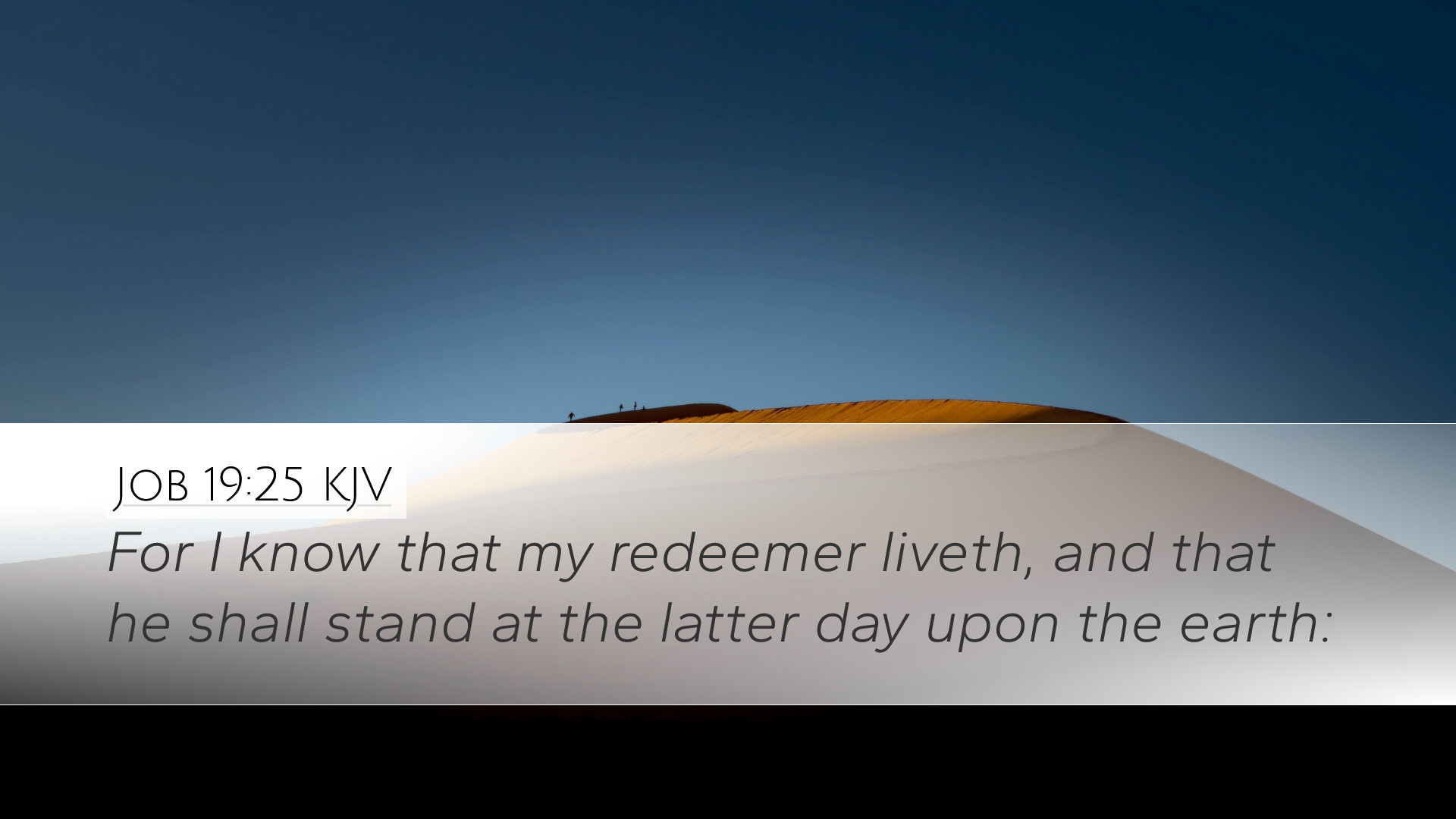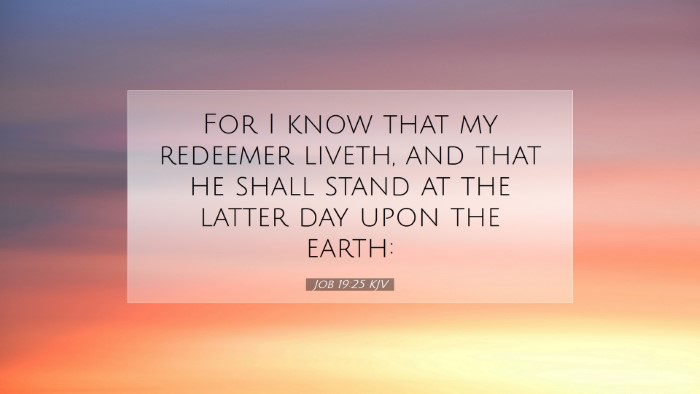Old Testament
Genesis Exodus Leviticus Numbers Deuteronomy Joshua Judges Ruth 1 Samuel 2 Samuel 1 Kings 2 Kings 1 Chronicles 2 Chronicles Ezra Nehemiah Esther Job Psalms Proverbs Ecclesiastes Song of Solomon Isaiah Jeremiah Lamentations Ezekiel Daniel Hosea Joel Amos Obadiah Jonah Micah Nahum Habakkuk Zephaniah Haggai Zechariah MalachiJob 19:25
Job 19:25 KJV
For I know that my redeemer liveth, and that he shall stand at the latter day upon the earth:
Job 19:25 Bible Commentary
Commentary on Job 19:25
Job 19:25 (KJV): "For I know that my redeemer liveth, and that he shall stand at the latter day upon the earth."
This profound declaration from Job encapsulates the essence of hope, faith, and confidence in divine redemption. Various public domain commentaries illuminate key theological and existential insights from this verse, and we shall summarize their thoughts in organized segments.
1. Contextual Background
Job, a man of upright character, experiences immense suffering and loss. This chapter occurs amidst his dialogues with friends who have misinterpreted his afflictions as judgment for sin. Job seeks to assert his integrity and trust in God despite his circumstances.
2. Insights from Matthew Henry
According to Matthew Henry, Job's declaration is a statement of faith in God's ultimate justice and vindication:
- Faith in the Redeemer: Job confidently asserts that his "redeemer" lives. This signifies that God is not distant or inactive but is indeed present in his suffering. Henry highlights the importance of knowing our Redeemer, emphasizing that this knowledge brings comfort in distress.
- Hope beyond the Grave: Henry interprets Job's mention of the "latter day" as a prophetic glimpse into the resurrection and the final judgment, where justice will be ultimately revealed. This reflects a nuanced understanding of life beyond earthly existence.
- Personal Assurance: Job states "I know" — Henry underscores that this is a personal conviction, not merely a communal belief. It reinforces the intimate relationship between Job and his God.
3. Insights from Albert Barnes
Albert Barnes offers an analytical perspective on Job's proclamation:
- Theological Significance: Barnes points out the theological implications of calling God "Redeemer." This title implies a trusted God who restores and redeems His people from sin and suffering, highlighting a redemptive relationship between God and humanity.
- Assurance of Justice: Barnes emphasizes that Job anticipates a time when God will publicly vindicate him — a scenario that aligns with the ultimate triumph of right over wrong in divine justice.
- Prophetic Insight: Barnes also addresses the Messianic implications of Job's statement. He sees Job’s belief as foreshadowing Christ, the ultimate Redeemer, reinforcing the Christian understanding of Job’s faith in God’s plan for salvation through Jesus Christ.
4. Insights from Adam Clarke
Adam Clarke adds depth to the understanding of Job's statement:
- Job's Suffering and Confidence: Clarke emphasizes that in the midst of overwhelming loss and betrayal, Job clings to hope. His confidence in "the Redeemer" is a critical element of his faith and illustrates a remarkable endurance through trials.
- Resurrection Assurance: Clarke interprets "stand at the latter day" as Job’s belief in a future resurrection. He argues that this reflects an understanding of life after death, thus playing a significant role in theological discussions about eschatology.
- Importance of Personal Conviction: Clarke stresses that Job's knowledge of the Redeemer is rooted in personal experience and faith, inviting believers to reflect on their relationship with God amidst their adversities.
5. Theological Reflections
The implications of Job 19:25 extend well beyond the temporal sufferings of Job to encapsulate core theological concepts relevant to pastors, students, theologians, and scholars today:
- The Nature of God as Redeemer: God is not merely a distant deity; He is actively involved in our redemption and struggles. Understanding God’s redemptive role shapes how believers approach their own suffering.
- The Assurance of Resurrection: This proclamation reinforces the hope of resurrection that is central to Christian theology, linking Job's faith to New Testament teachings on eternal life and resurrection through Christ.
- Faith Amidst Trials: Job's declaration serves as a model for enduring faith amidst suffering, inviting believers to cultivate a deep-seated trust in God regardless of circumstances.
6. Application for Life and Ministry
Praise for the profundity of Job's assertion leads to practical applications:
- Encourage Others: Pastors can draw from Job’s words to encourage those experiencing despair or persecution, reminding them of the hope and assurance found in the Redeemer.
- Teach on Redemption: This text serves as a basis for discussions on the nature of redemption throughout the Bible, fostering a richer understanding of what it means to be redeemed by Christ.
- Resilience in Faith: Job's unwavering belief in the midst of trial can inspire and teach others about resilience, emphasizing the importance of personal faith and its sustaining power in difficult times.
Conclusion
Job 19:25 stands as an extraordinary testament to faith, declaring both personal conviction and profound theological truths. As one reflects on the insights from Matthew Henry, Albert Barnes, and Adam Clarke, one cannot help but be encouraged by Job’s unwavering hope in his Redeemer – a promise of restoration that resonates through Scripture and provides a beacon of hope for all who struggle.


